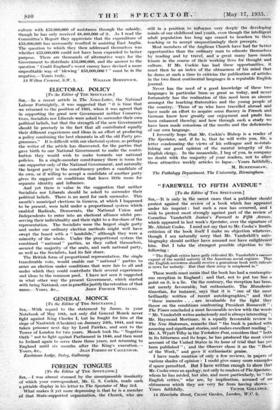" FAREWELL TO FIFTH AVENUE "
[To the Editor of Tni SiicikrOB.]
SIR,—It is only in the rarest cases that a publisher should protest against the review of a bOok which has appeared , under his imprint : but such a case has occurred, and
wish to protest most strongly against part of the review of Cornelius Vanderbilt Junior's Farewell to Fifth Avenue, which appeared in last week's Spectator, over the signature of Mr. Alistair Cooke. I need not say that to Mr. Cooke's hostile criticism of the book itself I Make no objection whatever, though I am naturally, sorry that Mr. Vanderbilt's auto- biography should neither have amused nor have enlightened him. But, I take the strongest possible objection' to the following " The English critics have gaily ridiculed Mr. Vanderbilt's earnest exposé of the sordid naivety of the. American social register. That the English reviewers should receive a -gratuitous book with ridicule is hews for nobody. But that their irony is misplaced is."
These wordi must mean that the book has had a contempt0- ous reception in England ; and that, not to put too fine a point on it, is a lie. Ort.the contrary, the reception has been, not merely favourable, but enthusiastic. The Manchester Guardian, for instance, says that it is " one of the most brilliantly written of recent autobiographies," and that " these memoirs . . are invaluable for the light they throw on the conditions confronting President Roosevelt " ; The Times concluded a most favourable review with the words " Mr. Vanderbilt writes audaciously and is always interesting "; Mr. Raymond Mortimer, in a equally favourable review in The New Statesman, remarks that " the book is packed with amusing and significant stories, and makes excellent reading " ; Mr. A. Wyatt Tilby in the Yorkshire Post, considers that " both in its bitterness and its hope, he has produced the most vivid account of the United States in its hour of trial that has yet been published " ; and the Observer chose it as the " Book of the Week," and gave it enthusiastic praise.
I have made mention of only a few reviews, in papers of various shades of opinion : I could give many more examples if space permitted. But I have written enough to show that Mr. Cooke owes an apology, not only to readers of The Spectator, whom he has misled, but also, and more particularly, to " the English critics," who are, by implication, accused of an obtuseness which they are very far from having shown.— Yours faithfully, VICTOR COLLA1WCZ. 14 Henrietta Street, Covent Garden, London, WC. 2.










































 Previous page
Previous page